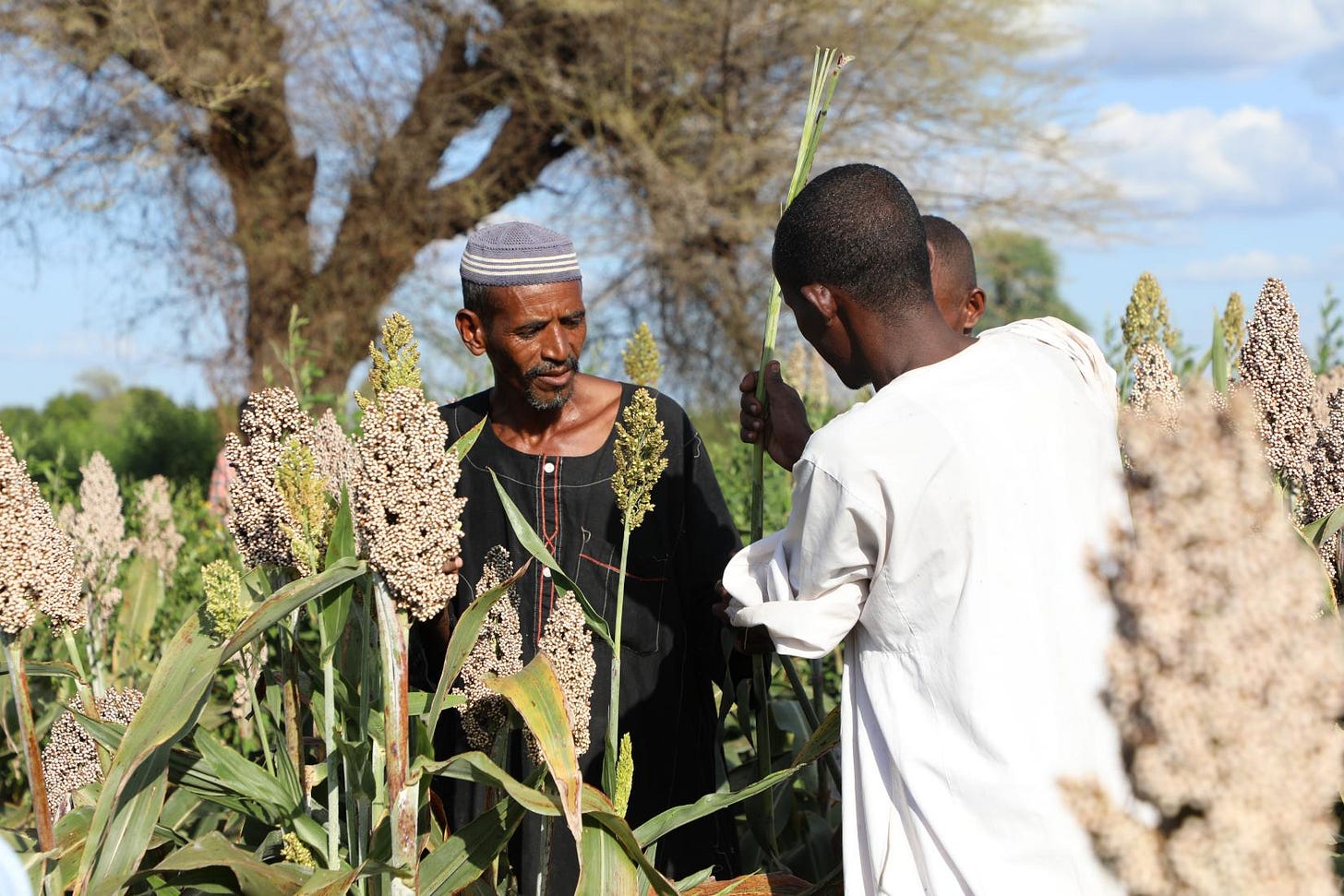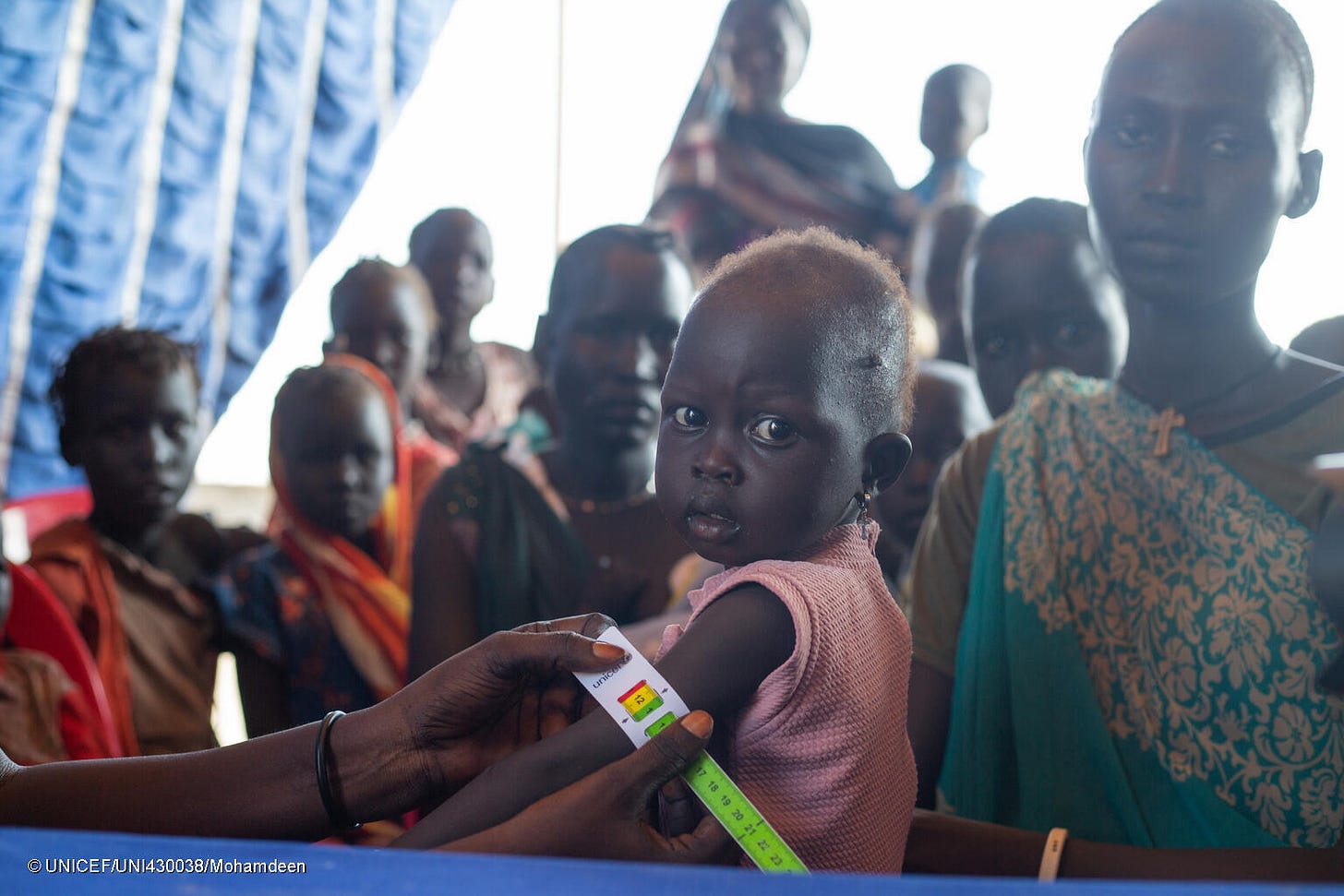Hunger stalks Sudan as warring parties ignore ceasefire pleas
Millions lack food but forecasts say nation will escape famine—for now
Sudan’s harvest season is underway, but millions of Sudanese will go hungry in coming months due to war, economic crisis, and bureaucratic impediments to humanitarian access, according to forecasts.
Between now and February, an estimated 4.9 million Sudanese will suffer severe hunger (IPC Phase 4, which is one level below famine), while 12.8 million will suffer food insecurity (IPC Phase 3), and another 18 million are stressed (IPC Phase 2).
These estimates come from IPC, a monitoring project implemented by a group of humanitarian organizations and UN agencies, funded by the European Union, UK, USA, and Canada. IPC uses a five-level scale to assess food insecurity. The acronym stands for “Integrated Food Security Phase Classification.”
None of Sudan’s population is expected to experience famine conditions in the coming months (as defined by the IPC, a famine involves death rates above 2 per 10,000 per day). However, in the longer term, a more serious catastrophe is possible as the war is undermining the country’s long-term ability to feed itself, wrecking infrastructure, bankrupting farmers, and making it difficult to move goods to market.
Meanwhile, even as food prices rise, millions of people who fled their homes and jobs have very little money to spend. The latest IPC report, published yesterday, stated:
Persistent intense urban conflict—particularly in key trade and commerce centers and along primary routes—is foreseen to continue, significantly hampering business operations. This disruption is expected to interrupt salary payments, diminish consumer activity, disrupt both food and non-food supply chains and lead to an economic contraction, thereby reducing purchasing power…
The price of food and essential commodities has soared… According to reports from numerous states, including those unaffected by the ongoing fighting, the conflict between SAF and RSF in Sudan is endangering the production of staple crops this year due to limited availability and distribution of seeds, inputs and agricultural finance, as well as restricted access to land for cultivation, livestock movement and seasonal activities.
Among the agricultural inputs affected are pesticides, herbicides, fertilizers, fuel, seeds, and spare parts for machines. These are more expensive or unavailable in some areas. According to an assessment by the UN Food and Agriculture Organization (FAO) last month, the total planted area during the summer season was 15% less than the five-year average. Production of the main staple cereals of sorghum and millet is expected to fall by 24% and 50%, respectively, compared to the previous season.
Desert locusts and other pests could also become a growing problem, “given the limited functionality of the government entities responsible for prevention and response as well as a shortage of pesticides,” according to the IPC report.
Specifically, Sudan’s Plant Protection Directorate failed to carry out pest control operations this year. Although FAO has helped it resume operations to control desert locusts in the country’s north and east, aerial spraying operations are now restricted due to the closure of Sudan’s airspace.
Sudan’s livestock sector is also at risk due to reduced availability of vaccines, and reduced access to water and pasture in some areas due to violence. In its recent assessment, FAO reported suspected cases of livestock disease in many states, including peste des petit ruminants, sheep pox, lumpy skin disease, foot-and-mouth disease, black quarter, tick-borne diseases, and botulism. “If the state veterinary services are not rebuilt, it is anticipated that there will be significant livestock losses.”
Sudan is a major exporter of cattle, sheep, and goats, as well as frozen meat. Pastoralism is also an important subsidence livelihood for many Sudanese.
Already, malnutrition rates have risen compared to last year. The IPC report points out, “Severe wasting admissions escalated with the onset of the conflict in majority of the states peaking in the months of June, July, and August 2023. This depicts serious inadequacies in the diets and disease outbreaks and limited supplies in the functioning health facilities in the preceding months and additional pressure by IDPs on limited resources. Algazira and River Nile states (non-conflict areas) recorded a very steep progressive increase in severe malnutrition from the month of May through to September 2023.” The data was incomplete for some states with active conflict.
The worst affected areas are Khartoum State—particularly RSF-occupied areas—and parts of the western regions of Darfur and Kordofan. But even peaceful states have seen higher levels of severe child malnutrition. For example, the IPC report says, “Based on program data from the health facilities, relatively peaceful states such as Gedaref reported continuously increasing trend with additional 1,000 children less than 5 years admitted per month in May-August 2023… This shows that the states that have less conflict equally have high vulnerability to malnutrition.”
In a press release yesterday, FAO “sounded the alarm about the escalating food security crisis in the Sudan, urging immediate and collective action to avert an impending humanitarian catastrophe.” The organization asked for for $75.4 million of additional funding, equivalent to the 80% unfunded portion of its 2023 Revised Humanitarian Appeal. “These funds are crucial to address escalating needs, enhance local food production, and improve its accessibility across the country.”
Food assistance from the World Food Programme (WFP) is also playing a major role in averting a catastrophe. While FAO focuses on strengthening domestic farmers, WFP distributes imported food, as well as cash vouchers in some circumstances. So far, since April 15, the agency gave food to more than 5 million people.
However, WFP warned in a press release that the new IPC analysis “shows the highest levels of hunger ever recorded during the harvest season (October through February), typically a period where more food is available. If there is no significant increase in food assistance by the time the lean season arrives next May, conflict hotspots could see the emergence of catastrophic hunger, also known as Phase 5 on the Integrated Food Security Phase Classification (IPC).”
Al-Burhan says it will be a long war
The Sudan Armed Forces Commander-in-Chief Abdel Fattah al-Burhan visited the 3rd Infantry Division in Shendi on Monday, December 11. His remarks are noteworthy in light of the claim by the IGAD Secretariat on the previous day that al-Burhan and his RSF counterpart both committed to an “unconditional ceasefire.”
Instead of confirming news of this ceasefire, Al-Burhan spoke in martial tones, vowing to continue the fight. As reported by state news media, he said in a speech to officers and troops, “The battle was imposed on us and we will continue in it until the end, and we are certain, God willing, that we will be victorious… None of us backs down or sells out our cause. We will win or die as martyrs.” Sudan’s Ministry of Foreign Affairs already had disputed IGAD’s claim that Al-Burhan committed to a ceasefire.
Also noteworthy is that al-Burhan did not repeat the typical mantra of SAF propagandists that “victory is near.” Instead, he warned of a long struggle ahead, saying, “The battle is still long, even if it ends in Khartoum there are other areas.”
During his visit, al-Burhan also inspected forces at Al-Ma’aqil Camp, visited the wounded at the military hospital in Shendi, and paid his condolences to the family of Major General Ayoub Abdel Qader, commander of the 17th Infantry Division, who was killed by an artillery shell in Khartoum in October.
In brief
In other news…
State news agency SUNA reported that “Life returned to normal in Babanusa, West Kordofan,” after many citizens fled due to fears of an RSF attack. The executive director of the locality, Abu Ubaida Bakhit Jakar “appealed to all citizens to return to the city and carry out their activities normally and not pay attention to the rumors spread by the instigators of strife and sabotage.”
General Bukhari Ahmed Abdullah, head of the Sudanese Alliance, a West Darfur armed group, announced leadership changes, sacking General Said Yusif Mahil from his position as vice president of the alliance, removing Hassan Moussi from his position as secretary-general, removing Abdelbagi Ali Shehto from the leadership body of the movement, and sacking Colonel Ayub Abubakar Mohamed from the West Darfur Sector Committee. He alleged that these officials had supported the RSF. The Sudanese Alliance formerly was led by West Darfur Governor Khamis Abakar, who was murdered in June.
Ayin published a report in Arabic titled, “‘They will not return to school’: The war pushes children into the labor market in Darfur.”
A hand grenade exploded during a funeral event in Mayo Block 2 Saturday, killing a woman and wounding four, according to the Southern Belt Emergency Room.
A local organization in Zalingei in Central Darfur launched a campaign to combat violence against women.
In case you missed our previous report, an IGAD summit took place over the weekend, resulting in some significant political developments.





